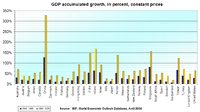
Photo from wikipedia
Abstract The aim of this paper is to evaluate the individual- and country-level variations in unregistered employment. To analyse whether it is marginalised groups who are more likely to engage… Click to show full abstract
Abstract The aim of this paper is to evaluate the individual- and country-level variations in unregistered employment. To analyse whether it is marginalised groups who are more likely to engage in unregistered employment and explain the country-level variations, a 2010 Life in Transition Survey (LiTS) involving 38,864 interviews in 35 Eurasian countries is reported. Multilevel logistic regression analysis reveals that younger age groups, the divorced, and those with fewer years in education, are more likely to be unregistered employed. On a country-level, meanwhile, the prevalence of unregistered employment is strongly associated with tax morale; the greater the asymmetry between informal and formal institutions, the greater is the prevalence of unregistered employment. It is also higher when GDP per capita as well as social distribution and state intervention (subsidies and transfers, social contribution expenditure, health expenditure) are lower. The paper concludes by discussing the theoretical and policy implications.
Journal Title: South East European Journal of Economics and Business
Year Published: 2017
Link to full text (if available)
Share on Social Media: Sign Up to like & get
recommendations!